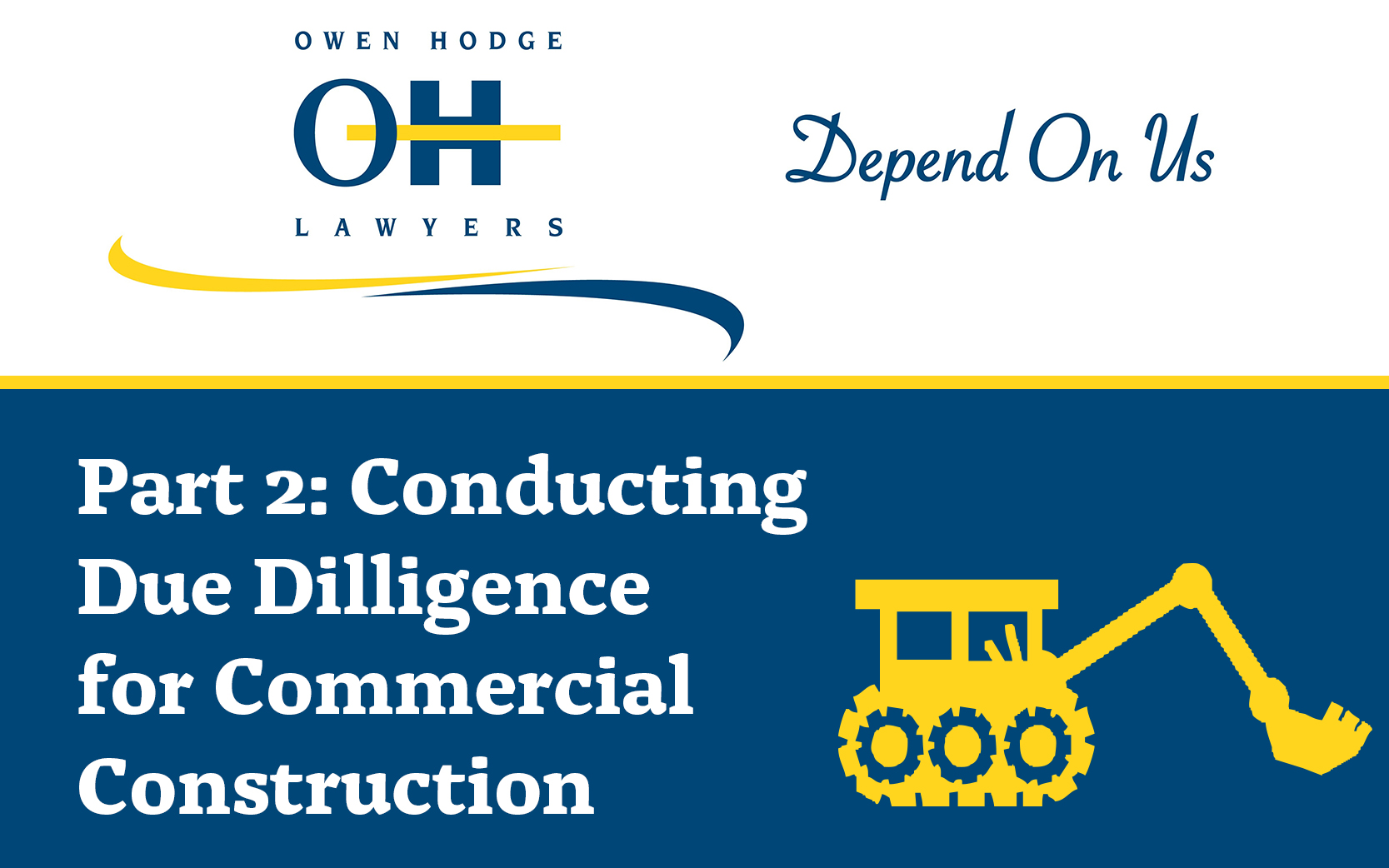
In this second instalment of our two part blog series, we discuss conducting due diligence for commercial construction. Read part one exploring the key points to consider prior to crafting a contract for commercial construction here.
Due diligence is an expansive concept, referring generally to any inquiry designed to weigh the likelihood that a contractual bargain will actually yield the hoped-for benefits. In the context of commercial construction this might include a review of risks associated with soil conditions, land use restrictions, planning approvals, reputation of other parties involved, market volatility, and so on.
Although these risks may also be covered in the contract, due diligence concerning the basic elements of the project ordinarily begins long before the agreement is inked.
As the deal moves along though, these and other issues become the focus of renewed interest in the phase of due diligence, often referred to as “legal due diligence”. At this stage, parties should work closely with legal counsel to ensure that the contract contains all the protections necessary and that those provisions are thoroughly and completely understood by everyone involved.
What should a contract include?
It depends, of course on the kind of construction contemplated and the nature of the relationship among the parties.
A project with highly technical specifications, like utility construction, will have requirements that a relatively simple building project, like a warehouse, may not. A Design, Development and Construct (DD & C) contract will outline different responsibilities than a Design, Construct and Maintain (DC&M) agreement. When the project is financed, the lender may have specific requirements designed to secure its investment.
Nonetheless, six basic categories of provisions should appear in all commercial construction contracts. The six categories are as follows:
Material Terms
These will vary from contract to contract, but at a minimum, every agreement should:
- specify contract and project completion dates;
- describe conforming performance, preferably with reference to objective standards;
- allocate risks to the party most likely to be able to control them, provide for
- indemnification and limit liability to the extent possible;
- provide for contract revision in the event of price increases or other material changes;
- delimit contractor fees and the right to appoint sub-contractors;
- describe maintenance requirements;
- require compliance with regulatory requirements; and
- detail grounds for contract termination.
Time Frame
Beyond the overall completion date, is may be prudent to set a schedule for completion of certain phases of the project. It may also decrease the likelihood of disputes if a method for requesting an extension of time is described in the contract.
Price and Fees

The contract should clearly state overall price and any additional charges involved. It may also be wise to incorporate a schedule of estimated costs and describe a procedure for dealing with any cost overruns.
Any other fees to be paid by the parties outside of the project price, including attorneys’ fees should be described in appropriate detail.
Payment Method
Consider the method, schedule and required security for payments. Should payment be scheduled at the expiration of certain intervals or on the achievement of certain milestones? Is it appropriate to build in an incentive payment for on-time or pre scheduled completion? Should payments be secured with an escrow fund, security bond or insurance?
Payment of Penalties
Under what circumstances should the contract include penalties for behind-schedule or inadequate performance?
Inability to Agree and Dispute Resolution
If the parties never reach agreement on final terms, it is important to specify that the contract, as a whole, is not enforceable, but it might be wise to provide for the creation of an interim agreement.
In the event that disputes arise in the course of performance, it is important to require recourse to alternative dispute resolution methods, including arbitration, before resort to litigation.
Perhaps most important is that contract provisions should be fully negotiated so that, on execution of the agreement, both parties fully understand their rights and obligations.
At Owen Hodge Lawyers, we look forward to working with you to conduct due diligence on your commercial construction project and to ensure that the endeavour comes to a satisfactory conclusion, free of extraneous disputes. Please call us at 1800 770 780 to schedule a consultation.
